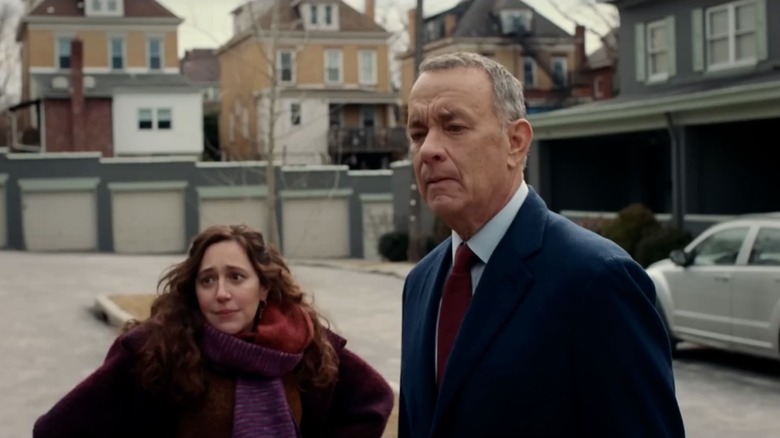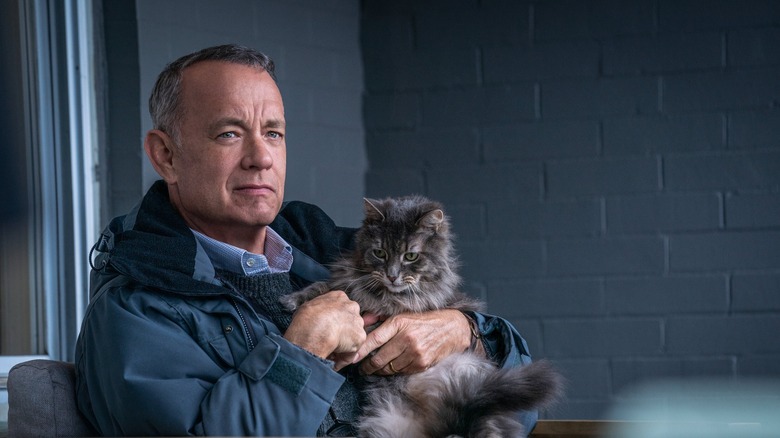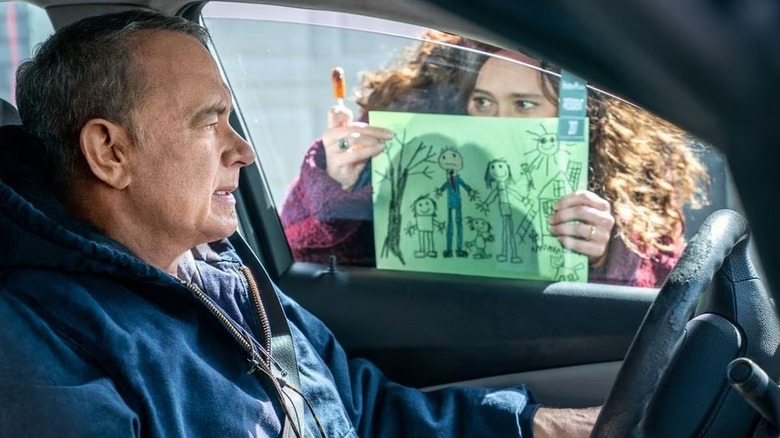Why Tom Hanks Felt A Man Called Otto Needed An American Adaptation
Marc Forster's "A Man Called Otto" is a dark comedy and a star vehicle for the undeniable Tom Hanks. In the movie, Hanks plays Otto, a grumpy curmudgeon who is starting to lose faith in his community in the aftermath of his widow's death. When a young family moves in next door, Otto's rough walls come down and he begins to open up his heart to his new neighbors and realize that there's still always more in store to live for. A mid-budget, tear-jerking dramedy sounds exactly like something that's been missing from Hollywood lately, but that's because "A Man Called Otto" is actually an import — as it's a remake of a Swedish film, "A Man Called Ove" and a novel of the same name.
There's an unfortunate tradition of Hollywood making Americanized remakes of foreign films and repackaging them for mainstream audiences. Not only does this lead to rather uninspired works, but the motivation to "retell" these stories from an American lens can also sometimes be interpreted as an act of "othering" different cultures and languages, making the American experience the "default" lens.
However, with "A Man Called Otto," there's actually something thematically promising beyond the surface of its new setting. Tom Hanks spoke with Collider about producing his new film, and the actor/producer explained why he found value in giving the story an American adaptation.
"My wife, Rita Wilson, is the true producer of this movie. We saw the original Swedish movie when it first came out in 2016" Hanks explained. "From the moment that we first saw it, we both felt that there was this American, ideal version of it that needed to be brought forward because the human condition requires belonging to a community.
Critiquing American individualism
Ultimately, the unique kind of isolation and loneliness that Tom Hanks saw within the character of Otto was one that he recognized as deeply American. In the effort of changing the name of the character, and creating a new version of the story that took place in a neighborhood community threatened to be torn apart by real estate companies, they found new, specific emotional truths from the source material. "In the United States, it is very easy to become so insular and so alone, and so singular that you might not be able to agree with enough people in order to belong to a community," Hanks told Collider, "particularly when somebody moves across the street that is very different from you. We thought that was a germ of an idea that could really be explored in the guise of this incredibly cranky guy."
Hanks's version of "A Man Called Otto" takes the source material, which was more centered on one individual's grief and how that inhibits his ability to find belonging, and turns it into a commentary on the folly of American individualism:
"Now, the novel by Fredrik Backman, as well as the original movie, are both masterpieces. So we figured out, 'Well, why bother trying to try to come up with a different version of it?' And the answer was because I think it is universal, the human condition is, and whatnot. And what Otto Anderson goes through is that fascinating mix between what he wants to avoid and what he absolutely has to have. He does not want a bunch of Mexicans moving across the street from him, but when they do, it's the best thing that could ever happen to him because it draws him into a much greater life than he would've had."
Imperfect, but earnest
The American retelling of "A Man Called Ove" is not perfect. For a film that's invested in taking the original themes of the source material and putting a uniquely "American" spin on it, it is shockingly apolitical to a degree that hurts the film. There are gestures at racism, transphobia, and modernism clashing with tradition — but the screenplay does not feel equipped to really confront any of it head-on. The resolutions are squeaky clean, and there's little internality given to Otto on why he changes outside of his tragic backstory with his first love.
But, what it does argue is that community and the feeling of connectedness are more important than "every man for themselves" American value systems, and that anyone, even someone as old and bitter as Otto, can still find true belonging. In a saccharine, melodramatic way, there's still something to "A Man Called Otto" that's compelling enough to let a few tears fall. It makes up for its shortcomings in its complete earnestness, and maybe, that's what a cynical American culture needs.


